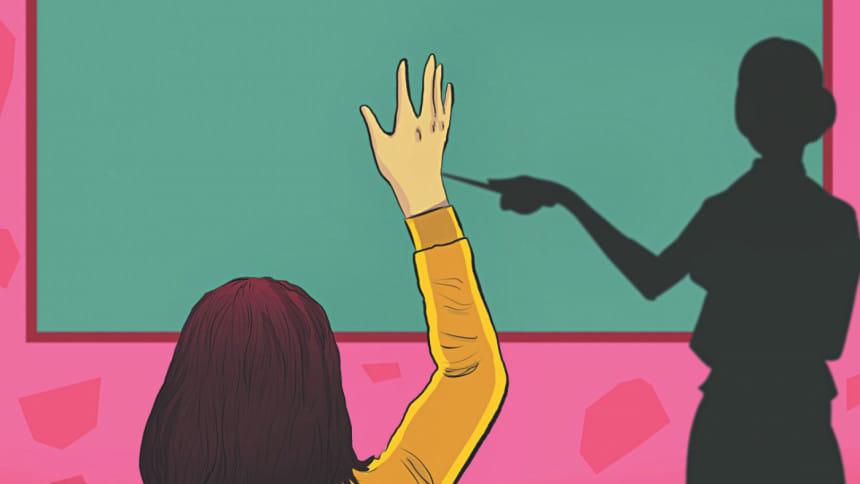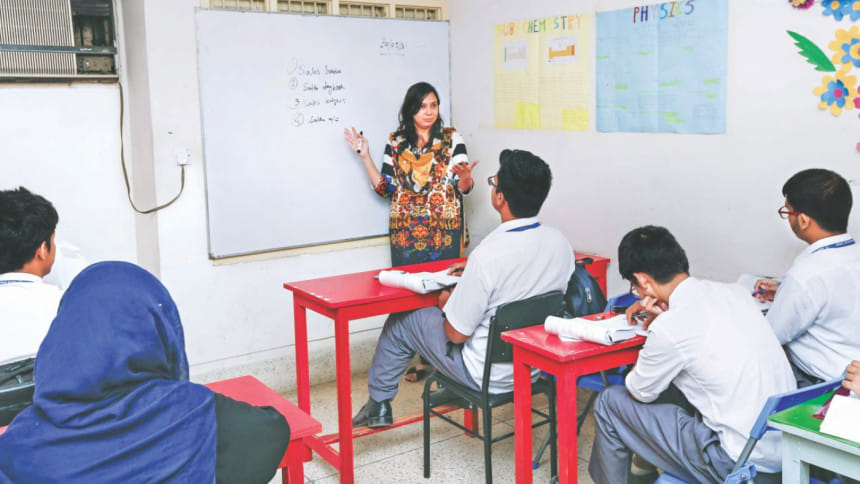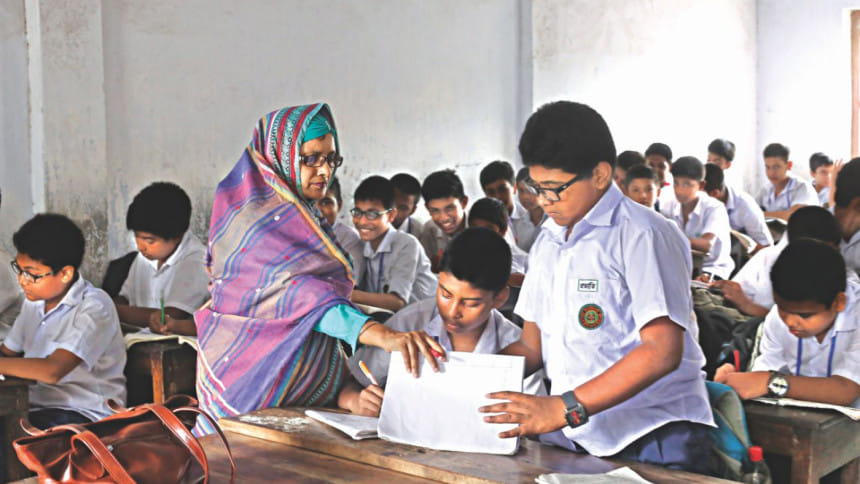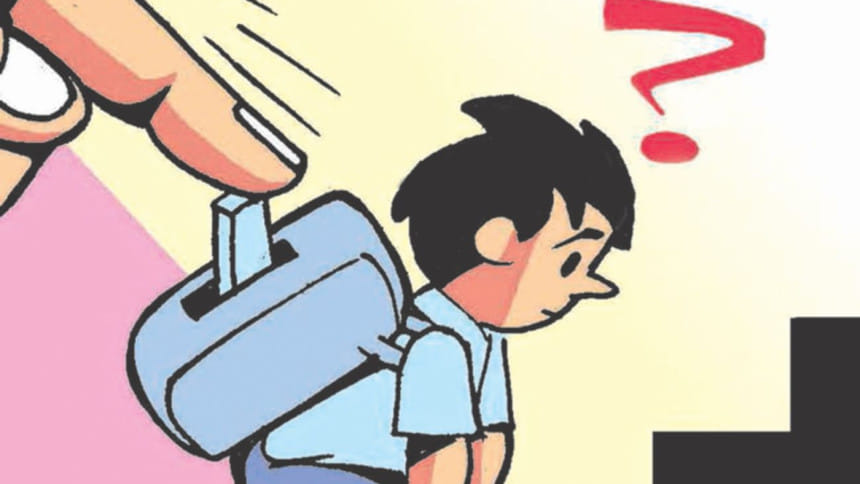Are we treating our kids right?

"Kids are the torch bearers of our future" – these are the words we hear often, from political speeches to assemblies in school grounds, on the note of someone trying to establish the important stakeholders for future progress of a nation. While that is the case, the sad reality is that most educational institutions seem to not invest as much time to the genuine well-being of the students. Instead, the social stigma and prejudice has led to the culture of rebuking students to prevail even today. Sure enough, our students deserve better.
"I have always been the sort of person to speak up when something that's clearly unjustified happens around me. This is why, one day when a math teacher said something inherently sexist, I spoke up. Surely enough, he didn't take it too well and I ended up at the Principal's room," recalls *Azhar Anjum, student at a private university in Dhaka, when asked if she had ever been in a situation where disciplinary action was taken unjustly towards her.
She elaborated the story, mentioning, "My parents were called in and I was shot down being called beyadob [ill-mannered] when I tried to explain my side of the story. The administration wouldn't hear any of it and I was suspended for a week. When I returned to school a week after, I noticed a lot of the other teachers were treating me differently only to find out later that a certain teacher took to his own to mark me as a 'bad' student. It was rough."
It's often seen that due to the subcontinent's norm of showing respect to elders, teachers find it offensive when a student tries to defend themselves, which then leads to students feeling threatened in a classroom – a place that should've been their safe space. This leads to students often replacing the idea of respecting teachers but with fear, creating an environment that not only harms the student's ability to ask questions but takes a toll in their learning process as well.
Of course, some situations require immediate action to be taken in order to help rectify a student's behaviour and allow them to improve themselves. Traditional disciplinary actions which have been followed in most educational institutions of our country include detentions, suspensions and in some cases even expulsions. However, the question we should all be asking is if the methods used to achieve such "goals" are actually serving the purpose. More often than not, highlighting the student's mistakes leads them to fixate on the issues rather than reflect on them constructively. Going forward, these students may find themselves in the middle of serious judgements and ridicule following the disciplinary actions taken against them.
*Sharafat Choudhury, student of a renowned school in Dhaka had once been suspended in middle school, for wearing a t-shirt with an inappropriate proposition while playing volleyball during recess. A few years down the line when he had begun high school, a teacher (whose private tuitions he had just discontinued) had complained about him due to the speculation of inappropriate behaviour with a friend. He was suspended that day while the classmate involved was let off the hook.

"My parents were called in during both these incidents and I was never given a chance to explain myself. My parents were humiliated and I felt as if the meeting was taking place to question my parents' upbringing of me instead of providing me with counsel. The allegations against me were extremely vague and most of what they had to say was out of speculation. The story was never corroborated by other individuals present at the time. The administrator handling the issue was new, and the moment they saw the previous suspension, they did not hesitate to sentence me with another," he said.
He further explained that throughout middle and high school, he had managed to maintain his grades as an Honour roll student while actively participating in sports and other extracurricular activities, but none of it was regarded by many of his teachers as they would constantly taunt him about the previous incidents.
Parents are an important determiner of regulating the impact of such drastic actions taken on a student by an authoritative figure at an institution. However, in most accounts it is seen that when parents are called in by the school, the situation is painted to humiliate parents where they are later advised to correct rather than counsel their children as a measure of disciplinary action. The impact of this is later faced by the child where the parents hold the child responsible for their humiliation rather than question the method of how the school approaches the situation. Thus the cycle of abuse on the child continues both at home and at school.
"As a parent, it is often very easy to get sucked into the socially established standards of what makes a 'good student' and thus put pressure on our children to fit that description. But it's important to realise that it's unrealistic for a child who's learning everyday to be responsible every step of the way. As adults with experience we have to be there for our children as they rely on us for support against all odds. Although it isn't always possible to act that way consciously we have to take up the effort to try," says *Shahera Zaman, parent of two.
Teacher-student relationship is a topic that isn't discussed as widely as it should be in our country. While there have been changes in the ways teachers deal with students in order to discipline them over the years, it is just not enough.

*Tanzila Haque, school teacher and a parent of three, says, "I believe being a mother has always given me an edge in understanding a student's psychology and reacting to situations accordingly. A teacher doesn't necessarily have to be a friend to their students to connect with them, but they need to create a platform where a student can feel free to question anything. I always stuck to the understanding that it isn't respect if a student listens to you out of fear for trouble –respect needs to be earned."
On the topic of how teachers should interact with students, Tanzila states, "It's common to see students punished in class in the form of humiliation that is thought to control their behaviour by teachers but this mode of conduct has extremely detrimental consequences as it may permanently leave a scar on the student. Before jumping to conclusions, it is the duty of every teacher to take some time to evaluate the right course of action and better yet, talk to the student to understand why they behaved in a particular way. Fear mongering should never be used as a tactic to bring order in the classroom."
Teacher at one of the leading English medium schools in Dhaka, Lubna R Kalam, commented that parents too should be towards the school, and especially in front of their children. She says, "We teachers and the parents should work as a team to help guide the students. If parents have a problem with the school they should discuss it privately away from their children. If the students can't respect their teachers, we can't help them learn. Parents should also try to be aware of their children's performance in school. When we send the kids home, they have all the details of the classwork and instructions on homework in their school diaries. Checking these and making sure the student is up to date with their schoolwork is enough to make sure your child is performing well."
Students spend a major part of their day in school, and so the takeaway from school is very crucial. Many children with unrest in their homes and personal lives may use school as a release for negative feelings and therefore act out.

*Shakila Ahmed, a school guidance counsellor agrees to this and says that traditional disciplinary actions taken against students are not effective in allowing students to develop. "Actions such as expulsions and suspensions can actually cause severe mental trauma to the students and their families as they are simply not restorative in their approach. The approach shouldn't be one that considers its sole purpose to be to punish the student, instead it should embrace the student in his or her weaknesses. This could be done by making them go through activities that allow them to realise the problem and recover accordingly," she says.
Restorative practices in schools make use of participatory learning and decision-making to improve behaviour, prevent conflict, and repair harm. Students are encouraged to see the reasons and results of their actions and focuses on the harm their actions may have caused on actual individuals instead of centring on guilt and blame. Where traditional disciplinary models seek to punish students, a restorative justice model seeks to resolve current conflicts and promote future improvements. Not only are students given the opportunity to be heard, they are also allowed to receive guidance and teaches them to solve problems. Often, students who have acted in these situations and ones who were on the receiving end, are both allowed to sit and communicate allowing them to completely understand the impact of these situations without the necessity of punitive disciplinary actions.
What if we started listening to our students? What if we started to help them resolve their own problems instead of punishing them for it? The children are suffering and we continue using age-old methods to impose the idea of consequences. Children tend to reciprocate the behaviour they observe; do we really want to teach them to deprive people of opportunities when they desperately need help? It is high time we let go of ancient methods of authoritarian response and make cooperative action possible.
*Names have been changed to protect the privacy of the individuals






Comments